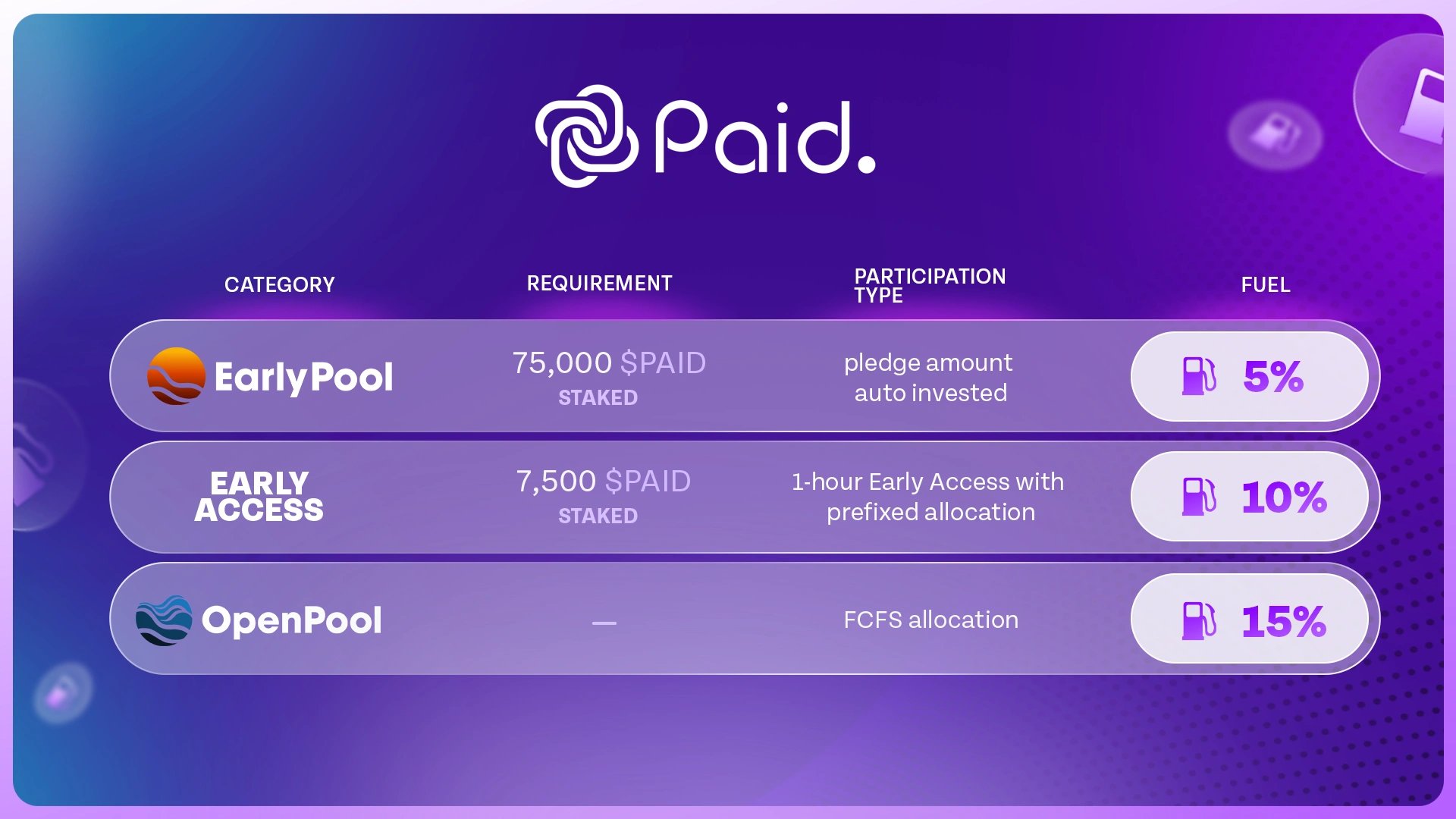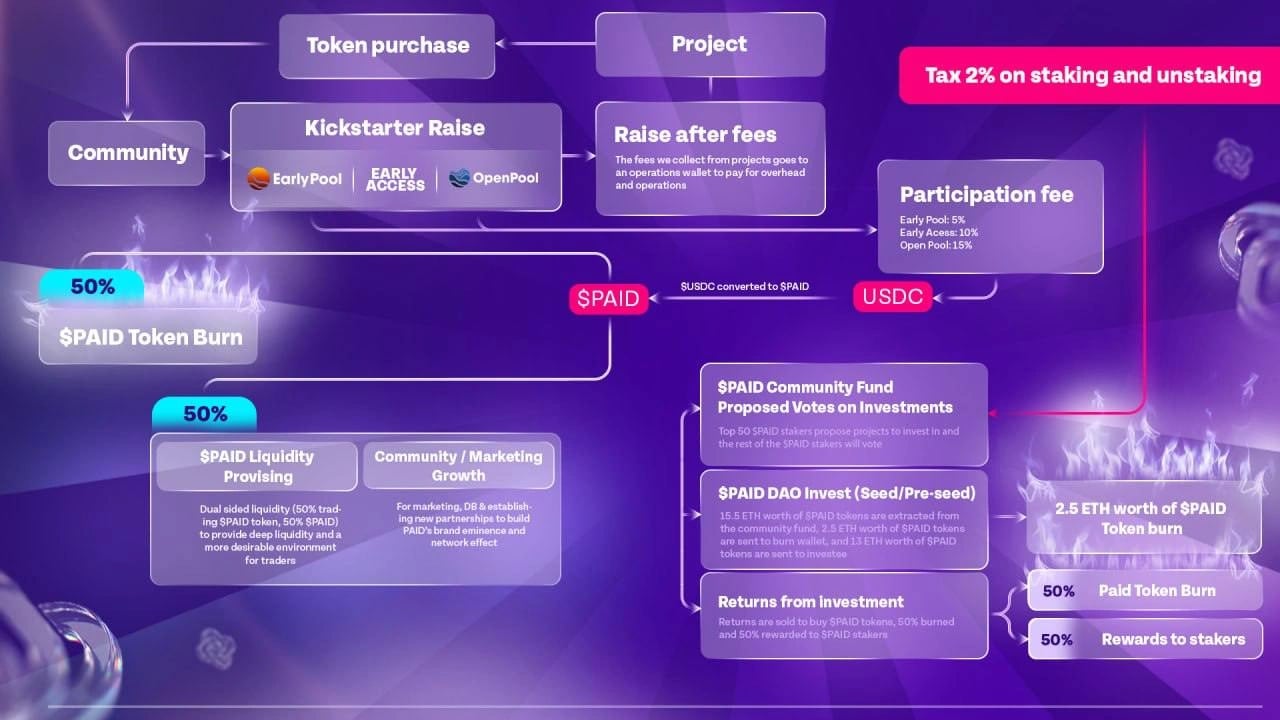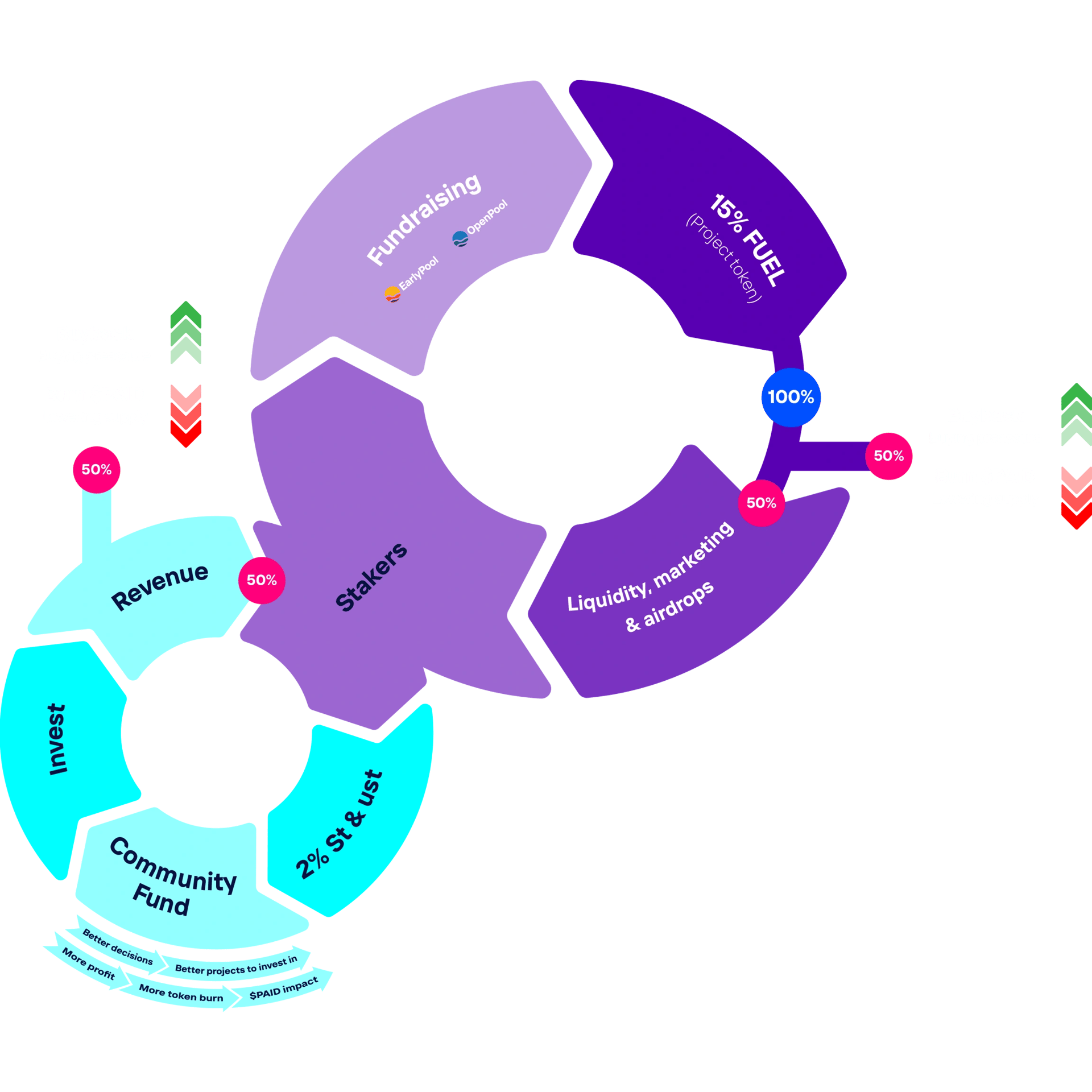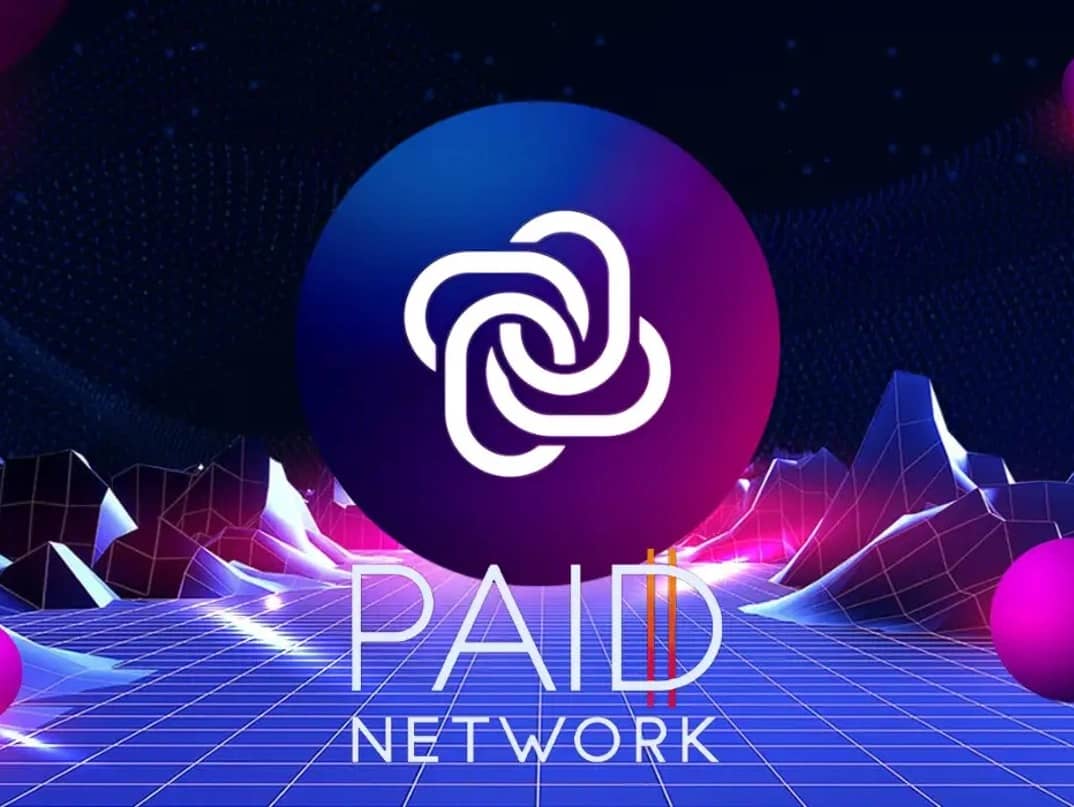Subscribe to wiki
Share wiki
Bookmark
PAID Network
The Agent Tokenization Platform (ATP):Build autonomous agents with the Agent Development Kit (ADK)
0%
PAID Network
PAID Network and its Ignition platform focus on decentralized business operations, smart agreements, and crowdfunding initiatives using blockchain technology. It strives to improve transaction transparency and efficiency while supporting innovative projects in the crypto ecosystem. [1]
Overview
Established in 2021, Ignition is PAID Network’s decentralized crowdfunding platform. It is known for launching numerous Web3 and crypto projects with significant returns, and PAID Network aims to support highly vetted projects and founders by providing crowd-sourced funding. Recognizing the need for improvements in transparency, security, and efficiency within the Web3 launchpad and crowdfunding sectors, they propose the Public Beneficiary Offering (PBO) model. [1][9]
The PBO model enhances transparency by ensuring all stakeholders have access to relevant information about projects and their funding processes. It addresses security concerns by using blockchain technology to provide immutable records of transactions and smart contracts to automate processes and reduce fraud risks. Additionally, it improves efficiency by streamlining the crowdfunding process, reducing approval times and transaction costs, and making it more accessible. PAID Network believes the PBO model and blockchain technology will bring significant innovation to the launchpad and crowdfunding industries, benefiting project creators and investors. [1][9]
Circular Economy
The $PAID team supports project fundraising activities through their Circular Economy. Participants do not need to hold $PAID tokens to participate; instead, they pay a percentage-based service fee on their investment amount. $PAID token holders with significant holdings have priority access through the EarlyPool, allowing early participation in both the EarlyPool and OpenPool. At the same time, other participants join the OpenPool on a first-come-first-serve basis. [5][9]

The participation fees collected are allocated to four activities aimed at decreasing $PAID’s circulating supply, enhancing token utility, and providing value to token holders: [5][9]
- Token Burn: This involves $PAID buybacks to reduce the circulating supply and potentially improve price action.
- Liquidity Provisioning: Ensuring deep liquidity allows for higher trade volumes with less slippage, creating a more favorable trading environment.
- Community Growth & Marketing: Building a marketing treasury to support business development and community-building efforts, which may increase demand for $PAID.
- $PAID Community Fund: This fund is funded by a 2% transaction tax on staking and unstaking. It invests in early-stage projects. The rewards are converted to $PAID tokens and provided as incentives to stakers.
These measures aim to support project fundraising while enhancing the value and utility of $PAID tokens. [5][9]
Self-Sustaining Token Economics
Platform-related interactions, such as staking and unstaking, will incur a 2% fee to fill the PAID Community Fund. These transaction fees aim to enhance the platform's sustainability. [5][9]
Real Yield APY
With the shift to a new model, $PAID will adopt Real Yield APY, moving away from the previous linear APY approach. This transition is driven by two primary factors: [5][9]
- Blockchain’s Shift to Sustainable Economic Models: The blockchain industry, characterized by rapid innovation, continually presents new ideas and strategies. Companies benefit from evaluating and adopting these new approaches. Real Yield Strategies and APY, already successfully implemented by several protocols (e.g., GMX, SNX, IMX), offer a sustainable alternative to the unsustainable token emissions of older strategies.
- Sustainability for $PAID: The high APY (15% to 60%) from previous linear staking emissions was unsustainable due to significant token emissions. Shifting to a more sustainable APY based on token revenue aims to increase the longevity of $PAID.
The transition reflects PAID Network's commitment to providing real value to users, moving away from unsustainable practices and high APY reliance. [5][9]

PAID Token
$PAID is a utility token with multiple utilities that foster long-term community value. Participation fuel generated from crowdfunding activities will be used for $PAID buybacks, with half of the collected fuel used to purchase tokens on the open market. Subsequently, the fuel will be burned to reduce the circulating supply and enhance scarcity. This deflationary strategy is intended to support the value of $PAID over time. [4]
Dual-sided liquidity with $PAID and major pairs like $ETH/$BNB will ensure robust liquidity depths, facilitating higher trade volumes with reduced slippage, which is advantageous for traders. Protocol revenue will primarily reward $PAID stakers through Real Yield APY and returns from the $PAID Community Fund, promoting a sustainable token economy. [4]
Additionally, token holders who stake $PAID on Ignition will be eligible for airdrops from partner projects launching on the platform. These airdrops, allocated as a percentage of the project's supply, will be distributed proportionally to staked $PAID holders, further incentivizing long-term engagement and participation. [4]
The participation fuel generated from crowdfunding activities will be used for $PAID buybacks, which will be allocated as follows: [4][9]
Token Burn
- Following each raise, half of the collected fuel is used to buy back $PAID on the open market, and the purchased tokens are then burned. This process removes the tokens from circulation, increasing scarcity and supporting a deflationary model for $PAID. [4][9]
Liquidity Provisioning
- Dual-sided liquidity with $PAID and $ETH/$BNB enhances the project's trading environment. Deep liquidity allows for higher trade volumes with less slippage, making the market more favorable for traders. [4][9]
Staking Rewards
- Protocol revenue will primarily reward $PAID stakers. Stakers will receive tokens through Real Yield APY and returns from the $PAID Community Fund, fostering a more sustainable and circular token economy in the long term. [4][9]
Partner Airdrops
- Token holders with staked tokens will be eligible for airdrops from partner projects launching on the PAID Network. [4][9]
$PAID Community Fund
The $PAID Community Fund is a pivotal component of the $PAID ecosystem, offering a novel approach to community collaboration. Its primary objectives include rewarding $PAID token stakers sustainably, attracting new participants to the ecosystem, and enhancing the token's burn rate through structured investments. Initially overseen by internal team members, the ultimate aim is to transition operational control to a decentralized autonomous organization (DAO) composed of $PAID token stakers. [6]
Key features of the $PAID Community Fund include proposals and voting mechanisms open to all stakers, with greater voting power tied to higher token stakes. This structure empowers the community to propose and decide on project investments, focusing on early-stage ventures that traditional launchpads often overlook. The Fund's returns are reinvested into $PAID tokens, distributed as incentives to stakers, and funded through a 2% on-chain tax on staking-related transactions. This model ensures sustainability while enabling robust support for emerging projects in the crypto space. [6]

Key Opinion Leaders (KOLs)
PAID Network and Ignition's collaboration with Key Opinion Leaders (KOLs) underscores a commitment to inclusive access to crypto and projects for all participants. Leveraging KOLs offers several advantages: [3]
- Enhanced Exposure: Partnering with KOLs amplifies visibility across social media platforms, reaching broader audiences and increasing brand awareness.
- Reliability and Confidence: KOLs, recognized for their credibility within their communities, enhance trust in PAID Network and Ignition among potential users and stakeholders.
- Community Engagement: KOLs foster active community participation through discussions, events, and advocacy, encouraging followers to engage with their communities and the PAID Network.
- Educational Advocacy: KOLs are crucial in educating the community about PAID Network's advancements and economic models, ensuring clarity and understanding among users and stakeholders alike.
KOL Advisors
- Alex Becker
- Altcoin Daily
- Crypto Banter
- Ivan On Tech
- Sheldon the Sniper
- Virtual Bacon
- Kyle Chasse
Launched Projects
- Thetan Arena
- Star Atlas
- Aioz
- Cryowar
- ShopX
- Sidus NFT Heroes
- Metis
- Good Games Guild
Partnerships
Backers
There are various investors in the PAID Network, including:
- Crypto.com Capital
- Animoca Brands
- A+ Ventures
- Newtribe Capital
- Huobi Ventures
- Andromeda Capital
- NEAR
- Spartan
- Solana Ventures
- KuCoin
- Cypher Capital
Integrations
Exchanges
Sniper School
On March 19th, 2024, PAID Network collaborated with Sheldon’s Sniper School, hosted by Crypto Banter. This partnership marked a step forward as PAID Network aimed to attract and onboard new users while providing them with essential education and guidance to navigate the complex world of crypto confidently. [7]
Lossless
On December 10th, 2021, PAID Network and Master Ventures proudly announced a new partnership with Lossless, an advanced DeFi hack and fraud mitigation tool. This collaboration allowed both parties to work closely with Lossless to minimize fraudulent activities within the blockchain and DeFi space. Lossless's technology enabled the urgent freezing of funds, fraud analysis, and the potential reversal of stolen funds upon confirmation of fraudulent activities. [8]
See something wrong?
The Agent Tokenization Platform (ATP):Build autonomous agents with the Agent Development Kit (ADK)
